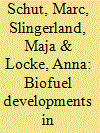|
|
|
Sort Order |
|
|
|
Items / Page
|
|
|
|
|
|
|
| Srl | Item |
| 1 |
ID:
098597


|
|
|
|
|
| Publication |
2010.
|
| Summary/Abstract |
Climate change, rising oil prices and concerns about future energy supplies have contributed to a growing interest in using biomass for energy purposes. Several studies have highlighted the biophysical potential of biofuel production on the African continent, and analysts see Mozambique as one of the most promising African countries. Favorable growing conditions and the availability of land, water and labor are mentioned as major drivers behind this potential. Moreover, the potential of biofuel production to generate socio-economic benefits is reflected in the government's policy objectives for the development of the sector, such as reducing fuel import dependency and creating rural employment. This article provides an overview of biofuel developments in Mozambique and explores to what extent reality matches the suggested potential in the country.
We conclude that biofuel developments mainly take place in areas near good infrastructure, processing and storage facilities, where there is (skilled) labor available, and access to services and goods. Moreover, our analysis shows the need to timely harmonize current trends in biofuel developments with the government's policy objectives as the majority of existing and planned projects are not focusing on remote rural areas, and - in absence of domestic markets - principally target external markets.
|
|
|
|
|
|
|
|
|
|
|
|
|
|
|
|
| 2 |
ID:
127293


|
|
|
|
|
| Publication |
2014.
|
| Summary/Abstract |
This paper describes and analyses the multi-actor governance process that made Mozambique the first African nation-state to develop a national policy framework for sustainable biofuels. The paper draws on findings from action research conducted in Mozambique between December 2008 and July 2012. We analyse interactions between the changing governance context, the course of the multi-actor governance process, and the choices in relation to governance framework characteristics and content for four successive stages of governance framework development. This provides the basis for reflection on the competences required for effective multi-actor sustainability governance, and a discussion about the role of the nation-state in sustainability governance of global economies such as biofuels.
The governance framework for sustainable biofuels has contributed to a more transparent and secure investment climate for biofuels in Mozambique. Key factors for success were (1) the presence of different types of competences during the various stages of the governance framework development, (2) closing the gap between 'licences to sell' and 'licences to produce' across different governance levels, and (3) balancing between the short- and long-term objectives for biofuel production in Mozambique and requirements of global biofuel markets. Developing-country nation-states can provide an essential contribution to these success-factors for global governance of sustainable biofuels.
|
|
|
|
|
|
|
|
|
|
|
|
|
|
|
|
| 3 |
ID:
109365


|
|
|
|
|
| Publication |
2011.
|
| Summary/Abstract |
This paper provides insights and recommendations for policy on the opportunities and constrains that influence the space for innovation for sustainable community-based biofuel production and use. Promoted by the Mozambican government, Nhambita community established jatropha trials in 2005. Initial results were promising, but crop failure and the absence of organized markets led to scepticism amongst farmers.
We start from the idea that the promotion of community-based biofuel production and use requires taking interactions between social-cultural, biophysical, economic, political and legal subsystems across different scales and levels of analysis through time into account. Our analysis demonstrates that heterogeneous farming strategies and their synergies at community level should be carefully assessed. Furthermore, national and international political and legal developments, such as the development of biofuel sustainability criteria, influence the local space in which community-based biofuel developments take place.
We conclude that ex-ante integrated assessment and creating an enabling environment can enhance space for sustainable community-based biofuel production and use. It may provide insights into the opportunities and constraints for different types of smallholders, and promote the development of adequate policy mechanisms to prevent biofuels from becoming a threat rather than an opportunity for smallholders.
|
|
|
|
|
|
|
|
|
|
|
|
|
|
|
|
|
|
|
|
|